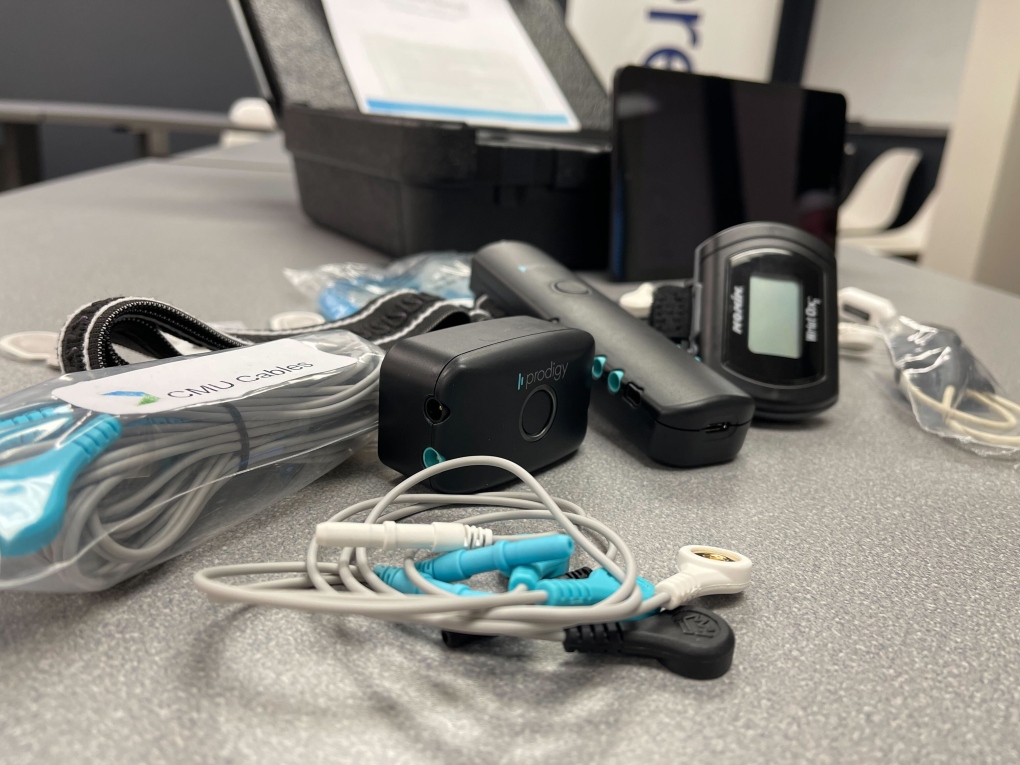Winnipeg company to help with sleep test backlog
 A Cerebra At-Home sleep study kit is pictured. (Image source: Michelle Gerwing/CTV News Winnipeg)
A Cerebra At-Home sleep study kit is pictured. (Image source: Michelle Gerwing/CTV News Winnipeg)
The private company providing Manitobans with 1,000 at-home sleep study tests said its product will work in tandem with the sleep disorder lab.
This week the province announced it is partnering with Winnipeg-based Cerebra as a short-term solution to address the sleep test backlog, which is more than 8,000.
“These tests that we are sending home are going to give the doctors the same kind of information they are going to get from the sleep lab only from the patient's home,” said Cerebra business manager Mark Younes in an interview with CTV News Friday.
He also showed the kit that will be sent home with patients in Manitoba.
The system comes in a hard carrying case. Inside are devices and electrodes the patient will attach to their head, chest, wrist and legs themselves before hitting start on the tablet and going to sleep.
Younes said the at-home test records brain activity, breathing and leg movement.
In the public setting, Younes said it'll help diagnose some common disorders like sleep apnea and periodic limb movement disorder.
Younes said the in-lab tests will always be needed for more complex cases.
"They can work in tandem,” Younes said. “Because what it actually means is the lab which in Winnipeg has 10 beds will have those beds available for the patients that really need that in-lab study so they don’t have to wait as long."
The union representing allied health staff working in the sleep lab is disappointed in the deal.
"We have a very well-run sleep disorder clinic at Misericordia hospital that needs investment made into it," said Jason Linklater, president of the Manitoba Association of Health Care Professionals (MAHCP).
The MAHCP president said the equipment at the Misericordia sleep lab is two decades old.
Based on experience with at-home tests, the union is also concerned about failure rates.
"We are aware that up to 30-per cent of at-home tests end up back into the public system at the sleep disorder clinic because of failure rates. So, it ends up being a double cost to the system by not going through the proper channels the first time," said Linklater.
Cerebra said its test performs much better than that.
"Our first-night success rate is quite high and so a lot of effort went into making sure the patient gets a good study," said Younes.
Eighty-five to 90 per cent success according to the company's clinical trials, he added.
Part of the success rate, according to Younes, is the instructional videos that come loaded onto the system's tablet and the final screen which tests each component before the patient starts the test and goes to bed.
Younes says Cerebra does not provide live support to patients with an at-home test because the videos and written instructions are enough to get people set up correctly.
The setup itself takes about 45 minutes.
The in-home test is available to eligible people at no cost according to the government press release.
The release did not mention how much provincial money will be spent on the deal with Cerebra.
In a prepared statement, a provincial spokesperson did not provide a cost for the program.
"As a part of the RFSA contract, Cerebra will work closely with the Province of Manitoba to reduce the pandemic backlog of diagnostic sleep studies. The cost for RFSA contracts are reported as a part of regular Manitoba government reporting," the statement reads.
CTVNews.ca Top Stories

'She will not be missed': Trump on Freeland's departure from cabinet
As Canadians watched a day of considerable political turmoil for Prime Minister Justin Trudeau and his government given the sudden departure of Chrystia Freeland on Monday, it appears that U.S. president-elect Donald Trump was also watching it unfold.
Canadian government to make border security announcement today: sources
The federal government will make an announcement on new border security measures after question today, CTV News has learned.
Two employees charged in death of assisted care resident who ended up locked outside building overnight
Two employees at an Oshawa assisted living facility are facing charges in connection with the death of a resident who wandered outside the building during the winter and ended up locked outside all night.
The Canada Post strike is over, but it will take time to get back to normal, says spokesperson
Canada Post workers are back on the job after a gruelling four-week strike that halted deliveries across the country, but it could take time before operations are back to normal.
Lion Electric to file for creditor protection
Lion Electric, a Quebec-based manufacturer of electric buses and trucks, says that it plans to file for creditor protection.
Canada's inflation rate down a tick to 1.9% in November
Inflation edged down slightly to 1.9 per cent in November as price growth continued to stabilize in Canada.
Transit riders work together to rescue scared cat from underneath TTC streetcar
A group of TTC riders banded together to rescue a woman's cat from underneath a streetcar in downtown Toronto, saving one of its nine lives.
Trudeau considering his options as leader after Freeland quits cabinet, sources say
Chrystia Freeland, Canada's finance minister, said in an explosive letter published Monday morning that she will quit cabinet. Here's what happened on Monday, Dec. 16.
Teacher and a teenage student killed in a shooting at a Christian school in Wisconsin
A 15-year-old student killed a teacher and another teenager with a handgun Monday at a Christian school in Wisconsin, terrifying classmates including a second grader who made the 911 call that sent dozens of police officers rushing to the small school just a week before its Christmas break.

































